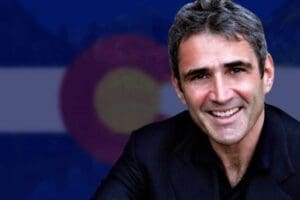
Roger Barris, 2018 Libertarian candidate for U.S. House in Colorado’s 2nd district
Libertarian Party [LP] candidate Roger Barris was interviewed for the Loveland Reporter-Herald on his race for Colorado’s second congressional district. From the feature story, “Colorado 2nd Congressional District candidate Roger Barris advocates Libertarian reforms,” by Julia Rentsch (July 15):
For Roger Barris, the Libertarian Party candidate running in Colorado’s 2nd Congress District this November, winning the race would be great — but coming in second [in the four-way race] would not be so bad, either.
Barris is a first-time candidate. He moved to Colorado last year after retiring from a career in entrepreneurship and investment banking in various European locations with firms including Goldman Sachs and Deutsche Bank.
No Libertarian has ever been elected to the United States House or Senate since the party was founded in Colorado Springs in 1971. As part of what Barris calls the ongoing “professionalization” of the party, which is registered as a minor party in Colorado, he said a second-place finish would send a message that the party is strengthening.
“The chance of my winning is remote,” he said. “… I’d love to win, of course — but, if I come in second, that is still an incredibly powerful message.”
Barris said his views follow the Libertarian Party platform pretty closely, in that he advocates for a small federal government, less American military interventionism abroad, more school choice and competition, and cuts to both taxation and spending.
“Competition is the key to everything; whether it is in the private or public sector, competition is a very good thing,” he said.
Barris, who has an MBA in finance [and] a bachelor’s in economics, advocates for free-market reforms to the nation’s schools.
He [said] that until the creation of the Department of Education in 1979, the federal government had no role in public education. Dissolving the department would return the process back to each state acting as its own “laboratory of education,” he said.
When asked if the privatization of education might hurt poor students, Barris bristled.
“Poor students get the worst education now,” he said. “People call it the public school — we have a regional school where the barrier to entry is, can you afford a house in a nice neighborhood.
Barris clarified that in his view, the richest people already benefit from school choice, as they can afford to pay property taxes in expensive locales or fund private-school education for their children. He wants to work on giving the same choices to everyone.
But, when it comes to capitalism, he notes there will still be inequality.
“We have chosen the system we have, which results in inequality, because we believe it will raise the most boats the fastest. We can’t look at every manifestation of inequality … and say ‘except, we don’t like it there.’ ”
“I absolutely want to reduce the taxation to the absolute minimum and have the taxes left over be logical,” he said.
Along with reduced taxes, Barris wants to reduce military spending. He said he wants the country to change the role of the military to noninterventionist, with its primary role instead being to defend the U.S. and its political interests.
“Getting the U.S. government out of being the world’s policemen is a better way to make us secure and not bankrupt the country,” he said. “If you want to be the world’s policeman, the money that requires never ends. And the quid pro quo for that, politically, is going to be spending a fortune on domestic policy as well.”
Barris said he is concerned about the national debt, and wants the federal government to both cut taxes and reign in its spending. While reducing the country’s debt, this plan would also work on reducing the size of the government, which Barris says is the answer to cutting through the hard-bitten partisanship the country has been experiencing.
“I’m convinced that a lot of the reason everything is so divided right now is because we have weaponized the federal government, so of course we have to fight like mad over who controls it,” he said. “… (W)hat is important is the stuff we do, our families, our communities, churches, clubs, everything else — we shouldn’t be looking for meaning in our politics. That’s not what politics is there for.”
Unlike many Libertarian candidates, Barris is able to campaign full-time and plans to inject between $25,000 and $50,000 of his own money into the race. Putting forth that effort is important, as winning a prominent portion of the vote in November may provide valuable gains to the party by helping to win over Republicans who disagree with their party’s current direction, he said.
“There’s a bunch of these people from the Republican Party who are on the verge of doing like (state Sen.) Laura Ebke (of Nebraska) and basically saying ‘goodbye’ to the Republican Party of Donald Trump and becoming Libertarians,” Barris said. “But, we have to be able to demonstrate to them that being a Libertarian, you can still get re-elected.”
If elected as a [Libertarian], Barris said, he stands to be able to work with both major parties to cut through gridlock.
“I think we can get more done because we are not one of the warring tribes,” he said.
Sen. Ebke (Neb.) left the Republican Party in May 2016 to join the Libertarian Party. On May 15 of this year, she was the runner-up in Nebraska’s top-two election, defeating the candidate endorsed by the governor, so she has advanced to the November 6 run-off election.
Learn more about Barris’s campaign at his website: Barris4Congress.com
LP Colorado is running over 30 candidates this year at nearly every level of government. Learn about them
here: LPColorado.org/candidates
Learn more about Sen. Ebke’s campaign at her website: LauraEbke.com
More than 825 Libertarian candidates are running for office this year nationwide. Learn more here: LP.org/2018-candidates
